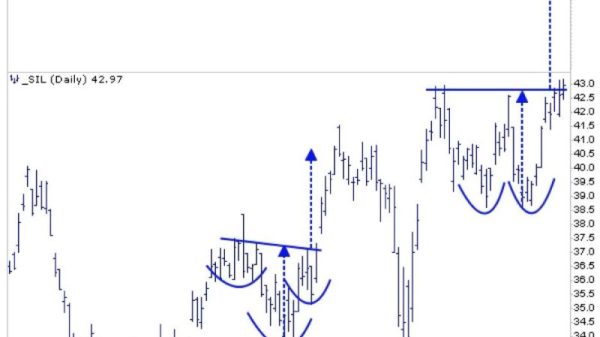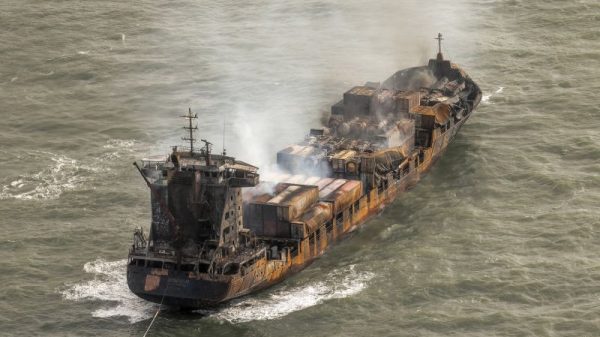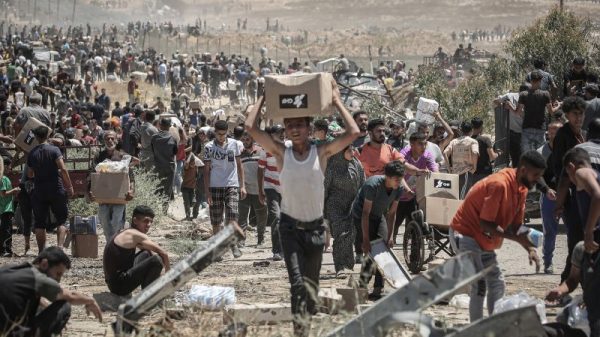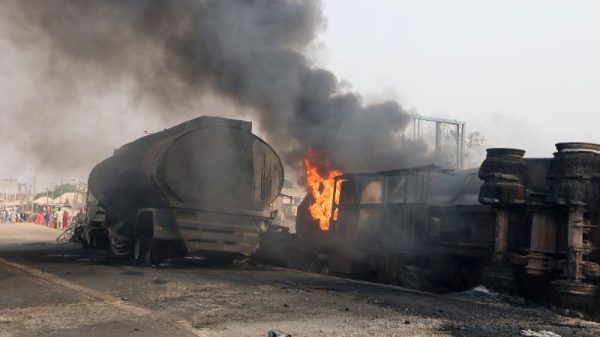President Donald Trump’s sudden halt to U.S. airstrikes against Yemen’s Houthi militants is drawing praise as a potential breakthrough – and doubts over whether it will last.
Trump on Tuesday at the Oval Office marked the formal end of ‘Operation Rough Rider,’ a 50-day bombing campaign that targeted more than 1,000 sites across Yemen.
‘The Houthis have announced that they don’t want to fight anymore,’ Trump said during remarks at the White House. ‘They say they will not be blowing up ships anymore. And that’s what the purpose of what we were doing. So… we will stop the bombings.’
Bard Al-busaidi, the foreign minister of Oman, who has been involved in peace negotiations, confirmed that talks had led to a ceasefire agreement. ‘In the future, neither side will target the other, including American vessels, in the Red Sea and Bab al-Mandab Strait, ensuring freedom of navigation and the smooth flow of international commercial shipping.’
While Trump portrayed the ceasefire as a straightforward military win, experts say the path to this moment was built on deliberate diplomatic escalation – namely, a dual-pronged threat against both the Houthis and their Iranian backers.
‘This was about linking Houthi aggression directly to Iran,’ said Can Kasapoglu, senior fellow at the Hudson Institute. ‘The Trump administration signaled clearly: any further attacks would bring consequences for Tehran as well. That was the actual key to success.’
The campaign’s origin in March followed a surge in Houthi attacks on international shipping and the dramatic escalation last weekend, when a missile from Houthi-controlled territory landed near Israel’s Ben Gurion Airport. That prompted a retaliatory Israeli airstrike on Yemen’s main airport in Sana’a, which military officials say crippled Houthi air capabilities.
Lt. Col. Eric Navarro, director of the Red Sea security initiative at the Middle East Forum, called the ceasefire ‘a product of overwhelming pressure,’ pointing to precision U.S. strikes on Houthi command-and-control infrastructure and weapons depots, paired with Israeli air assaults.
‘They saw the writing on the wall,’ Navarro said. ‘I would argue that this is the kind of pressure that needs to be applied over time – not just to the Houthis, but also to the Iranian regime.’
From a military standpoint, Trump’s campaign leveraged significant assets, including bombers flying from Diego Garcia and two U.S. aircraft carriers operating in the region. That show of force, combined with clear diplomatic signaling, appears to have catalyzed the ceasefire – at least for now.
Still, not all analysts see the Houthis as a grave threat or the campaign as a necessary use of force.
‘Trump’s surprise announcement that the U.S. will stop airstrikes against the Houthis is the right decision, regardless of whether the group stops targeting U.S. vessels,’ said Rosemary Kelanic, director of the Middle East program at Defense Priorities. ‘The Houthi threat was always more hype than substance.’
Kelanic argued the group’s attacks on shipping ‘neither damaged the U.S. economy nor contributed to inflation, which actually went down during the militant group’s assaults throughout the Red Sea and Gulf of Aden.’ In her view, ‘the Houthis’ biggest achievement was tricking the U.S. into wasting some $7 billion of its own resources by bombing them.’
‘Trump’s bold choice shows there are offramps from endless escalation in the Middle East,’ she added.
Jon Hoffman, a research fellow in defense and foreign policy at the Cato Institute, said, ‘Washington’s open-ended and congressionally unauthorized strikes against the Houthis for targeting shipping in the Red Sea was the epitome of strategic malpractice, neglecting the origins of the conflict (the war in Gaza) and failing to deter the group while squandering billions in taxpayer dollars.’
Military analysts remain skeptical about the Houthis’ long-term reliability.
‘I am always worried about groups like the Houthis sticking to anything they say,’ said Navarro, warning that the ceasefire could simply be a pause to rebuild their capabilities. ‘We need to remain vigilant… and adopt a broader strategy that includes not just military tools, but economic and informational pressure, and support for local alternatives to Houthi control in Yemen.’
Still, the Trump administration is framing the halt as a strategic victory that demonstrates how military power, when wielded with diplomatic clarity, can yield tangible political results.
‘Massive WIN. President Trump promised to restore the freedom of navigation in the Red Sea, and he used great American strength to swiftly deliver on that promise. The world is safer with President Trump in charge,’ said White House press secretary Karoline Leavitt.
‘If they can deliver this,’ said Kasapoglu, ‘it would be a major, major victory for the Trump administration.’
Whether the ceasefire holds – or proves to be merely a lull in a longer conflict – remains to be seen. But for now, the bombs have stopped, and Washington is claiming a win.




















